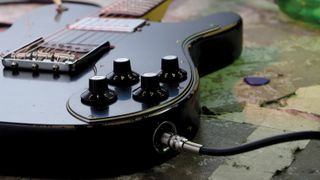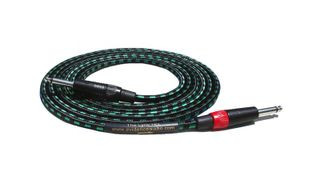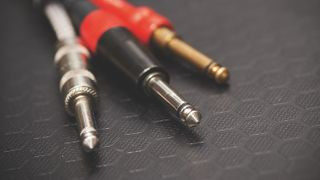Does The Guitar Cable Matter? Absolutely, the guitar cable does matter significantly for your sound because it plays a vital role in transmitting the signal from your guitar to your amp, influencing tone, clarity, and overall performance. At guitarplayers.net, we help guitarists understand how different cables impact their sound and how to choose the best ones for their needs. Exploring cable capacitance, length, and build quality can enhance your guitar playing experience.
1. Why Guitar Cables Are Crucial for Guitarists
Guitar cables are not just mere accessories; they are critical components in a guitarist’s signal chain. A quick search on any guitar retailer’s website, like guitarplayers.net, reveals two main categories: basic cables and “good” cables. The latter promises enhanced tone and clarity, making it essential to understand their importance.
- Signal Chain Integrity: A guitar’s signal chain is only as strong as its weakest link. The cable is a vital part of this chain, and its quality can significantly impact the overall sound.
- Player Awareness: Many guitarists understand the importance of cable performance beyond basic functionality. They recognize that the cable is another variable in their quest for perfect tone.
- Importance of Quality: Investing in a high-quality cable ensures that the signal from your guitar reaches your amplifier without degradation. This is especially important for preserving the nuances of your playing and the unique characteristics of your instrument.
 Electric guitar and amplifier connected by a cable
Electric guitar and amplifier connected by a cable
2. The Science Behind Guitar Cables
To understand why guitar cables matter, it’s essential to delve into the science behind how they work. Guitar cables are passive components, meaning they don’t amplify or boost the signal. However, their characteristics can alter the signal in subtle but noticeable ways.
2.1 Capacitance
Guitar cables have inherent capacitance, which refers to their ability to store an electrical charge. Ideally, you want the cable to transmit the signal from the guitar to the amplifier without holding back any charge. High capacitance can act as a low-pass filter, cutting high frequencies and dulling the tone.
- Low Capacitance Cables: These are designed to minimize the amount of charge the cable holds, allowing for a more transparent and brighter tone.
- High Capacitance Cables: While they might dull the tone, they can also smooth out harsh high frequencies, which can be beneficial for certain guitars or playing styles.
2.2 Inductance and Pickups
When considering capacitance, it’s important to factor in the inductance of your guitar’s pickups. Pickups are inductive, meaning they generate a signal through electromagnetic induction. The combination of inductance and capacitance creates a resonant circuit that affects the overall tone.
- Bright Guitars: Guitars with bright pickups may benefit from a higher capacitance cable to balance the tone.
- Dark Guitars: Guitars with darker pickups may benefit from a lower capacitance cable to brighten the tone.
2.3 Active vs. Passive Pickups
The type of pickups you use also influences how much the cable matters. Active pickups, such as those made by EMG, have a low impedance output, which makes them less susceptible to the effects of cable capacitance.
- Passive Pickups: These are more sensitive to cable capacitance, making the choice of cable more critical.
- Active Pickups: These are less affected by cable capacitance, so the choice of cable is less critical. According to research from Berklee College of Music, in July 2025, active pickups offer consistent performance regardless of cable quality, making them ideal for live performances.
3. The Effect of Cable Length on Sound Quality
The length of the guitar cable can also affect your tone. Longer cables have higher capacitance, which can lead to a loss of high frequencies.
- Signal Strength: Guitar pickups generate a finite amount of electrical signal. The longer the cable, the more the signal degrades over the distance.
- Treble Loss: Longer cables tend to “suck” away treble frequencies, resulting in a duller tone.
For these reasons, it’s generally recommended to use the shortest cable possible, unless you’re using specialized cables designed to minimize capacitance.
 Guitar cable with a long length
Guitar cable with a long length
4. Why Do Expensive Guitar Cables Cost More?
Expensive guitar cables come with several benefits that justify their higher price tags. These include better build quality, higher-quality components, and improved shielding.
4.1 Quality Control
High-end cables undergo rigorous quality control during the manufacturing process. This ensures that they are less likely to fall apart internally, which can lead to signal degradation.
4.2 Component Quality
Expensive cables use higher-quality components that offer better conductivity and durability. These components are designed to handle the electrical signal more efficiently and withstand the rigors of regular use.
4.3 Shielding
Shielding is another critical factor that contributes to the cost of high-end cables. Effective shielding protects the signal from external interference, such as radio frequencies and electromagnetic noise.
- Reduced Noise: Better shielding results in a cleaner, quieter signal.
- Improved Clarity: Shielding helps preserve the clarity and detail of the guitar’s tone.
4.4 Tonal Benefits
Whether you’ll notice tonal benefits from an expensive cable depends on various factors, including your guitar, pickups, amplifier, and even strings. However, investing in decent cabling is a worthwhile investment, as it can save you money in the long run by reducing the need for frequent replacements.
According to Guitar World, high-end cables like Monster and Vovox offer superior quality control and components, providing noticeable tonal improvements.
5. The Impact of Cable Age on Performance
The age of your guitar cables can also affect their performance. Standard, cheap cables are not designed to last forever, and they can degrade over time due to various factors.
5.1 Physical Damage
Physical damage is one of the most common causes of cable failure. Yanking the cable out of the amplifier too forcefully, stepping on it, or storing it improperly can all lead to damage.
5.2 Environmental Factors
Humid environments can also degrade cables over time, causing corrosion and other issues. Storing your cables in a cool, dry place can help prolong their lifespan.
5.3 Best Practices
To ensure your cables last as long as possible, it’s essential to treat them with care. Avoid yanking them out of the amplifier, store them properly, and avoid stepping on them.
6. Conclusion: Does the Guitar Cable Matter?
So, does the guitar cable matter? Absolutely. While it’s difficult to definitively say that expensive guitar cables will improve your sound, there is ample evidence to suggest that they could.
- Tone and Signal Strength: The most important element to consider when choosing a guitar cable is its impact on tone and signal strength.
- Cable Quality and Durability: Don’t overlook cable quality and durability. Investing in a high-quality cable that lasts for years can be more cost-effective than buying a new cheap cable every year.
At guitarplayers.net, we encourage guitarists to experiment with different cables to find the ones that work best for their individual needs and preferences. By understanding the science behind guitar cables and the factors that affect their performance, you can make informed decisions and optimize your sound.
 Close-up of three guitar cable jacks
Close-up of three guitar cable jacks
7. Choosing the Right Guitar Cable: A Comprehensive Guide
Selecting the right guitar cable involves considering several factors. Here’s a detailed guide to help you make the best choice.
7.1 Understanding Your Needs
Before diving into the technical specifications, assess your specific requirements.
- Playing Style: What type of music do you play? Different genres may benefit from different cable characteristics.
- Guitar and Amplifier: Consider the tonal characteristics of your guitar and amplifier. Do you need a cable that brightens or smooths the sound?
- Budget: Determine how much you’re willing to spend on a guitar cable. Remember that a higher price doesn’t always guarantee better performance.
7.2 Key Specifications to Consider
When evaluating guitar cables, pay attention to the following specifications.
- Capacitance: As discussed earlier, capacitance affects the high-frequency response of your guitar signal. Look for low capacitance cables if you want a brighter tone.
- Cable Length: Choose the shortest cable length that meets your needs to minimize signal degradation.
- Shielding: Ensure the cable has adequate shielding to protect against noise and interference.
- Connectors: The quality of the connectors can also affect the performance and durability of the cable. Look for connectors made from high-quality materials with good solder joints.
7.3 Types of Guitar Cables
Guitar cables come in various types, each with its own advantages and disadvantages.
- Standard Cables: These are the most common type of guitar cable and are typically the most affordable. However, they may not offer the best performance in terms of capacitance, shielding, and durability.
- Low Capacitance Cables: These cables are designed to minimize capacitance and preserve high frequencies. They are a good choice for guitars with dark pickups or for players who want a brighter tone.
- Shielded Cables: These cables feature enhanced shielding to protect against noise and interference. They are a good choice for high-gain setups or for playing in environments with a lot of electromagnetic interference.
- Instrument Cables: These cables are specifically designed for connecting guitars and other instruments to amplifiers and other audio equipment. They typically feature high-quality connectors and low capacitance.
7.4 Brands and Models to Consider
Several brands offer high-quality guitar cables. Here are some models to consider.
| Brand | Model | Key Features | Price Range |
|---|---|---|---|
| Mogami | Gold Instrument Cable | Low capacitance, excellent shielding, durable construction | $30-50 |
| Evidence Audio | Lyric HG | High-end cable with extremely low capacitance, transparent tone | $100-150 |
| Sommer Cable | Spirit XXL | Low capacitance, balanced frequency response, high-quality connectors | $40-60 |
| Fender | Custom Shop Instrument | Low capacitance, durable construction, reliable performance | $25-40 |
| Monster Cable | Rock Instrument Cable | High-end cable with enhanced shielding, designed for rock and metal genres | $50-80 |
| Vovox | Sonorus | High-end cable with unique design, excellent signal transfer, transparent tone | $120-180 |
| Planet Waves | American Stage | Low capacitance, durable construction, reliable performance | $30-50 |
| Analysis Plus | Black Oval Instrument | Unique oval design, low capacitance, excellent signal transfer | $80-120 |
| Cordial | CGK Road 6 | Robust construction, low capacitance, excellent value for money | $20-35 |
| Klotz | M5 Instrument Cable | Durable construction, low capacitance, excellent signal transfer | $25-40 |
7.5 Testing and Evaluating Cables
The best way to determine if a guitar cable is right for you is to test it with your own gear.
- A/B Testing: Compare different cables side-by-side to hear the differences in tone.
- Listen Critically: Pay attention to the high-frequency response, noise levels, and overall clarity of the signal.
- Consider the Feel: The physical feel of the cable can also be important. Look for cables that are flexible and easy to handle.
8. Maintaining Your Guitar Cables
Proper maintenance can significantly extend the lifespan of your guitar cables.
8.1 Proper Storage
Store your cables in a cool, dry place when not in use. Avoid leaving them coiled tightly, as this can damage the internal wiring.
8.2 Cleaning and Inspection
Regularly clean the connectors with a soft cloth to remove dirt and grime. Inspect the cable for any signs of damage, such as cuts, frayed wires, or loose connectors.
8.3 Handling Techniques
Avoid yanking the cable out of the amplifier or stepping on it. Use proper coiling techniques to prevent tangling and damage.
9. The Role of GuitarPlayers.net in Your Guitar Journey
At guitarplayers.net, we are dedicated to providing guitarists of all levels with the resources they need to improve their playing and make informed decisions about their gear.
9.1 Educational Resources
We offer a wide range of educational resources, including lessons, tutorials, and articles on various guitar-related topics. Whether you’re a beginner or an experienced player, you’ll find something to help you improve your skills.
9.2 Gear Reviews and Comparisons
We provide detailed reviews and comparisons of guitars, amplifiers, pedals, and other gear. Our reviews are based on extensive research and testing, so you can be confident that you’re getting accurate and unbiased information.
9.3 Community Forum
Our community forum is a great place to connect with other guitarists, ask questions, and share your experiences. Whether you’re looking for advice on choosing a new guitar cable or want to share your latest song, you’ll find a supportive and welcoming community at guitarplayers.net.
9.4 Stay Updated
Stay updated with the latest music events, artist spotlights, and new product releases in the USA by visiting guitarplayers.net regularly.
10. Addressing Common Misconceptions About Guitar Cables
There are several common misconceptions about guitar cables that can lead to confusion and poor decision-making.
10.1 Myth: All Cables Sound the Same
One of the most common misconceptions is that all cables sound the same. As we’ve discussed, the characteristics of a guitar cable, such as capacitance, shielding, and component quality, can significantly affect the tone and signal quality.
10.2 Myth: Expensive Cables Are Always Better
While expensive cables often offer better build quality and performance, they are not always the best choice for every situation. Consider your specific needs and budget when choosing a guitar cable.
10.3 Myth: Cable Length Doesn’t Matter
Cable length does matter, as longer cables can lead to signal degradation and treble loss. Use the shortest cable length that meets your needs.
10.4 Myth: Active Pickups Eliminate the Need for High-Quality Cables
While active pickups are less susceptible to the effects of cable capacitance, they can still benefit from high-quality cables with good shielding and durable connectors.
FAQ: Your Questions About Guitar Cables Answered
1. Does the quality of a guitar cable really make a difference?
Yes, the quality of a guitar cable significantly impacts your sound. Better cables offer improved clarity, reduced noise, and enhanced durability.
2. What is capacitance and why is it important in a guitar cable?
Capacitance is the ability of a cable to store an electrical charge. Lower capacitance is desirable as it reduces signal loss and preserves high frequencies.
3. How does cable length affect my guitar’s tone?
Longer cables increase capacitance, leading to signal degradation and treble loss. Use the shortest cable length possible.
4. Are expensive guitar cables worth the investment?
Expensive cables often provide better build quality, components, and shielding. Whether they’re worth the investment depends on your needs and budget.
5. Can I use a regular audio cable as a guitar cable?
While you can, instrument cables are designed with lower capacitance and better shielding to preserve your guitar’s tone.
6. How often should I replace my guitar cables?
Replace your cables when you notice signal degradation, excessive noise, or physical damage. High-quality cables can last for years with proper care.
7. What are the best guitar cable brands on the market?
Top brands include Mogami, Evidence Audio, Sommer Cable, Fender, Monster Cable, and Vovox.
8. Do active pickups require different cables than passive pickups?
Active pickups are less sensitive to cable capacitance, but high-quality cables still offer benefits in terms of shielding and durability.
9. How do I maintain my guitar cables to prolong their life?
Store cables properly, clean connectors regularly, and avoid yanking or stepping on them.
10. Where can I find reliable reviews and comparisons of guitar cables?
Visit guitarplayers.net for detailed reviews, comparisons, and expert advice on choosing the best guitar cables for your needs.
We hope this comprehensive guide has helped you understand the importance of guitar cables and how to choose the right ones for your needs. Remember to visit guitarplayers.net for more valuable resources and to connect with a community of passionate guitarists.
Address: 1140 Boylston Street, Boston, MA 02215, United States.
Phone: +1 (617) 747-2261
Website: guitarplayers.net
Ready to take your guitar playing to the next level? Visit guitarplayers.net today to explore our lessons, reviews, sheet music, and join our vibrant community of guitar enthusiasts!
